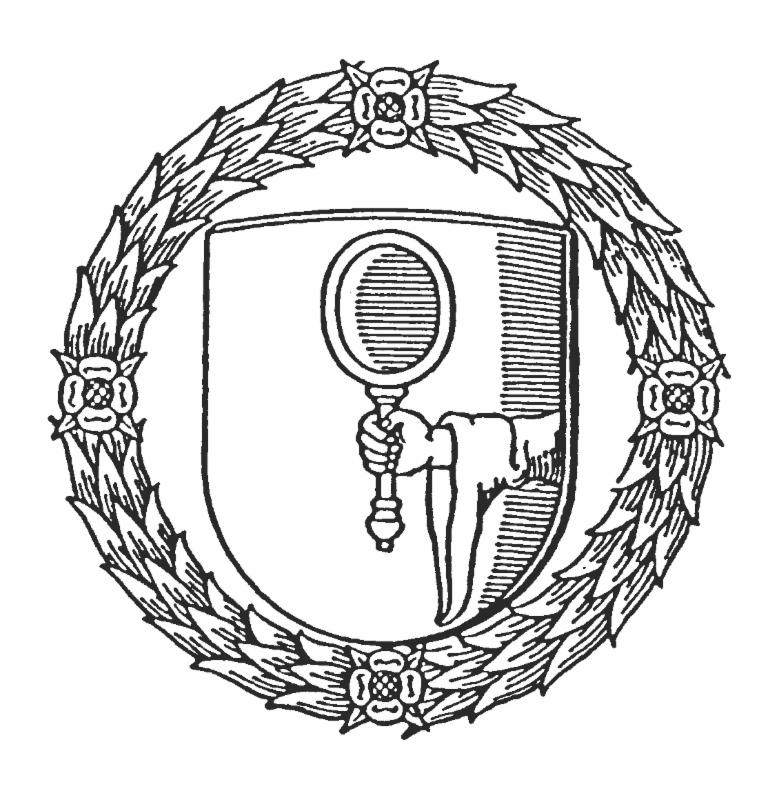 Happy New Year from the Editor’s Desk at Speculum: A Journal of Medieval Studies.
Happy New Year from the Editor’s Desk at Speculum: A Journal of Medieval Studies.
Founded in 1925, the Medieval Academy of America marks its centennial anniversary this year. As you will have seen from other columns in this newsletter, many events around the country have been planned to honor this milestone. Here at Speculum, we are contributing to the commemoration by dedicating our January issue to the theme of “Medieval Studies and Its Institutions.” Commissioned by former MAA President Thomas Dale and the MAA Council, from a proposal by Sara Lipton and Suzanne Akbari, and guest edited by Roland Betancourt and Karla Mallette, this issue may have already landed in your mailbox. It marks the MAA’s centennial by examining the historical context from which it emerged and, equally importantly, the organizations that grew up alongside it to challenge and subvert—as much as to supplement and enhance—the approaches and subject matter of medieval studies represented by the MAA. It is a critical look in the mirror from which all medievalists can learn and benefit.
After the editor’s introduction (free to read on our website), which lays out the themes, subthemes, and stakes of the issue, Carol Symes, Renée R. Trilling, and D. Fairchild Ruggles look at the MAA’s foundational moment with “Medievalists in the Mirror: Looking Back to the World of 1925 and Its Legacy,” while Sarah LaVoy-Brunette and Dusti C. Bridges tackle the topic of “Anglo-Saxonism and Indigenous Dispossession: Land-Grab Universities and the Emergence of Medieval Studies” of the period. Turning to the “micro-communities” of medievalists that developed to push the field to think more broadly, Melissa Ridley Elmes and Nicole Lopez-Jantzen examine the “Society for Medieval Feminist Scholarship and Medieval Studies: Our Institutions, Our Selves; Our Past, and Our Future,” while Eileen A. Fradenburg Joy and Myra Seaman, in an article drawing on oral histories, recall “Why, Sometimes We’ve Believed Six Impossible Things Before Breakfast: The BABEL Working Group.” Appropriately for the final article of the issue, the Material Collective’s “In Praise of Collectivity: Why Radical Solidarity Is Our Only Hope” looks both backward and forward in its assessment of the field, closing with a Manifesto for a Modern Medieval Studies that encourages medievalists to build “cooperatives in their own academic communities.” The issue concludes with a roundtable of short pieces by Tarren Andrews, Alexander Beecroft, Shirin Fozi, Sharon Kinoshita, Ali A. Olomi, Zrinka Stahuljak, and Anna Wilson, who reflect on current institutional crises and propose solutions for the future. The curated essays in this issue are written by senior scholars and graduate students alike and do the work of historicizing the foundation of the MAA, while at the same time demonstrating how our shared field has developed, been shaped by, and ultimately refashioned by “para-institutions” over the course of the century. It is a must-read issue for all medievalists who wish to know about our past, present, and even our future. Many thanks to the Karla and Roland whose guiding hands brought the issue from proposal to publication.
As is now our established practice, a companion podcast, Speculum Spotlight—a collaboration between the Multicultural Middle Ages team and Speculum—will have now posted. This episode, produced and hosted by Will Beattie, features a far-reaching conversation with the editors of the centennial issue that takes us above and beyond it to discuss the state of the humanities in our current apprehensive moment. As the editors note, their hope is that the issue serves “as a time capsule for future historiographers” which demonstrates how far our field has come over the course of one hundred years.
Turning to the future, as most members of the medievalist community already know, Barbara Newman has been named as the incoming editor of Speculum, and she will take over the reins of the journal in July. The staff and I congratulate Barbara on this appointment and look forward to working with her and her team during the transition period starting later this spring.
Until then, as the gyre turns and the journal itself moves toward its own centennial year in 2026, readers can expect upcoming issues of Speculum to represent the best of our multidisciplinary field, with forthcoming articles on early medieval burial archeology and plague studies; Carolingian codicological innovation; early medieval queens and textile production; the shifting landscape of orientalist motifs in crusading literature; the Minneleich by the Middle High German poet Frauenlob; chronology, mobility, and diet in early medieval Britain; temporality and history in the frescos at Anagni; emotions in Old Norse literature; the dowries of grooms in Catalonia; the Hebrew Bible’s story of Joseph in medieval France; Greco-Arabic literature in the Baghdad translation movement; the social functions of Latin-runic epigraphy in medieval Scandinavia; Islam in the writings of Eulogius; and East-West encounters in Asia. And in January 2026, we will publish Speculations, the centennial issue of the journal. Though this list indicates our deep pipeline of articles, like Janus we also look forward to and welcome your submissions!
We’ll see you in Cambridge at the centennial meeting of the MAA in March.
Until then, Happy New Year from the entire staff at Speculum!
Katherine L. Jansen
Editor



